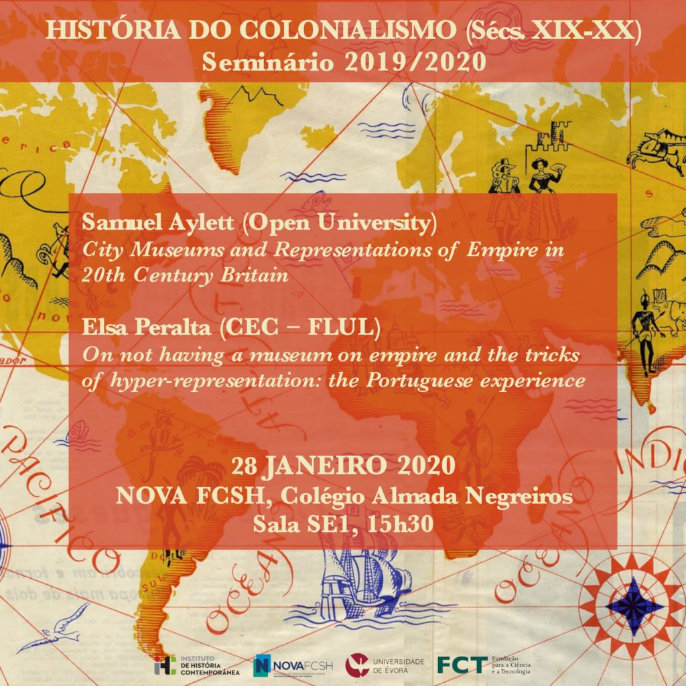Seminário de Investigação em História do Colonialismo (sécs. XIX-XX) #2
Início: ⋅ Fim: ⋅ Países: Portugal
O Seminário de Investigação em História do Colonialismo (sécs. XIX-XX) do Instituto de História Contemporânea da NOVA FCSH pretende constituir-se como um espaço de discussão informal e aberto em que investigadores/as possam apresentar e debater as suas pesquisas (em curso ou já concluídas) sobre qualquer aspecto da história do colonialismo, descolonização e sociedades pós-coloniais nos séculos XIX e XX.
A primeira edição decorrerá entre Janeiro e Junho de 2020. Cada sessão será constituída por uma apresentação (20 a 30 minutos) ou duas apresentações complementares (máx. 40 minutos no conjunto), seguindo-se uma troca de ideias sobre a temática abordada.
2ª Sessão:
28 de Janeiro de 2020 (15h30m)
Colégio Almada Negreiros (Campus de Campolide)
Sala SE1 (Piso 0)
Samuel Aylett (Open University): City Museums and Representations of Empire in 20th Century Britain
Using the Museum of London as my principal case study, my paper will analyse the place and value of histories of empire within the Museum’s permanent galleries when it opened in 1976. The Museum of London was an amalgamation of two former London museums, the Guildhall Museum (1826), and the London Museum (1910); a ‘civic trophy cabinet’ struggling to break free of its antiquated collections. Encumbered by this anachronistic museological framework, the history of empire served as the apogee to a whiggish narrative of London beginning in pre-history and rising to the height of its glory with Victorian Imperialism.
Colonial historians have maintained that museums and their collections imitate the contours of imperial history. With the onset of decolonisation, museums were said to have engaged in the erasure of imperial allusions, relegating empire to museums’ picture stores and ‘haunting the footnotes of journals and monographs.’ My paper will challenge this narrative, arguing that contrary to a conscious erasure empire remained central to constructing metropolitan narratives at city museums in the UK in the latter half of the twentieth century. My paper will contribute to an on-going debate, which started in the 1980s, around the impact of empire on culture in Britain in the twentieth century. It is now widely held that there was ‘never likely to be any single monolithic imperial culture in Britain’. Rather, empire found expression in different settings at different times, evidencing the complex and ambiguous relationship between Britain and its empire in the twentieth century.
Elsa Peralta (CEC – FLUL): On not having a museum on empire and the tricks of hyper-representation: the Portuguese experience
If museums are key tools in the construction and reproduction of national identity narratives, and if Portugal’s national narrative is almost obsessively centred in the period of the “Discoveries” and the imperial past, why does not exist in Portugal a museum explicitly dedicated to this topic? Taking as a background the current discussion about the creation of a Museum of the Discoveries in Lisbon, this presentation aims to address the issue of the representation of the Portuguese colonial empire through museums in the national public space, especially in Lisbon.
Entrada Livre. Todas/os bem-vindas/os.
Organização: Linha Temática Colonialismo, Anti-Colonialismo e Pós-Colonialismo, IHC – NOVA FCSH


